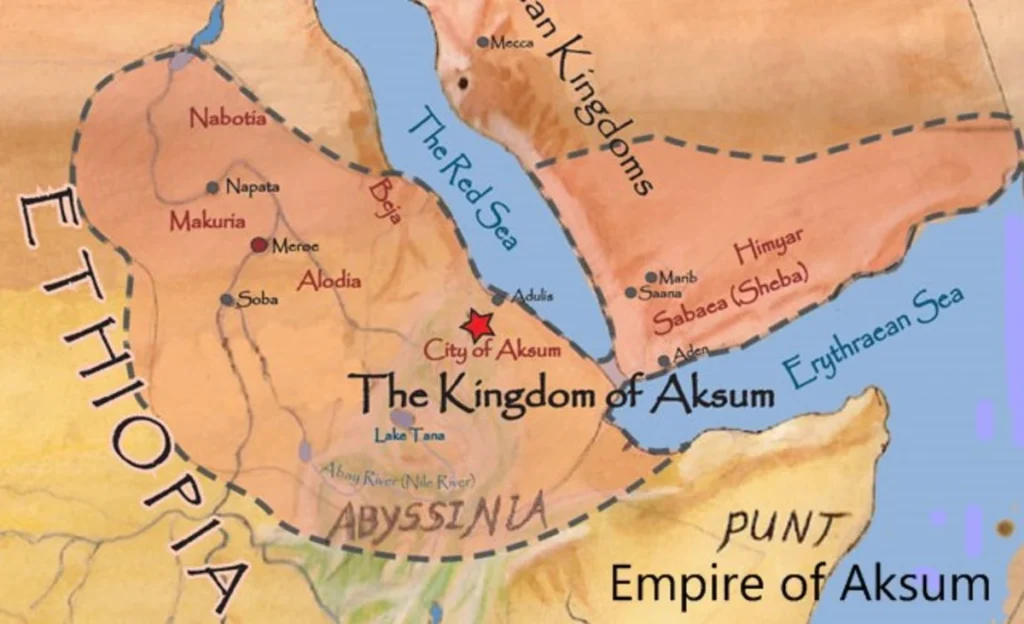Kingdom of Aksum

The ancient kingdom of Aksum, also known as the Aksumite Empire or Abyssiniawas located in what is modern day, Eritrea and northern Ethiopia. It was a thriving kingdom that existed between the 1st and 8th century AD. Due to its geographical location between the Indian Ocean and the Mediterranean Sea, it grew into an important trading nation of northeastern Africa and was a major player in commerce between India and the Roman Empire, with the main exports being ivory, gold, tortoise shell, precious stones, silk and spices.
The Aksumite kingdom was made of three ethnicities, the ‘Habeshas’ or semitic-speaking people, the ‘Kunama’ or Cushitic-speaking people, and the ‘Nara’ or Nilo-Saharan-speaking people. The Aksumites owned slaves and had a modified feudal system in place to farm the land. The population was predominately followed polytheistic and Judaic religions until 325, when Emperor Ezana adopted Christianity after being converted by his slave-teacher Frumentius, the founder of the Ethiopian Orthodox Church. Aksum is also the alleged home of the holy relic the Ark of the Covenant.
According to Ethiopian tradition, the Kingdom of Aksum was the home of the Queen of Sheba, even though the queen lived many years before the founding of Aksum, the kings of Aksum trace their ancestry to the queen of Sheba and King Solomon of Israel. This is the reason why the ruling house of the kingdom of Aksum is known as the Solomonic Dynasty. It’s said that it was through Aksum’s claim to fame – trade, that the queen of Sheba heard of the wisdom of Solomon, and decided to visit him for herself, and the rest, as they say, is history.
In it’s heyday, the kings of Aksum didn’t only control the territories of Aksum, which were located in modern day, northern Ethiopia and Eritrea, but their influence stretched to northern Sudan, southern Egypt, and all the way to the Arabian Peninsula. During the 3rd century, Aksum started minting its own currency, and was named as one of the four great powers of its time, alongside, Rome, Persia and China. Aksum controlled the western Tihama region, and dominated states in the Arabian Peninsula, forcing them to pay regular tribute to Aksum.
The kingdom of Aksum remained a strong empire and trading power in the region but with the rise of Islam, new trade routes were soon established, forcing Aksum towards economic isolation. As a result, trade stopped flowing through this once great kingdom, and it eventually came to an end. While the kingdom of Aksum came to an end, its capital, Aksum remained a city in Ethiopia, and became one of the country’s main centers of Orthodox Tewahedo Christianity.
Unlike the mercurial relationship that Islam had with Christian Europe, Aksum, which at one time, provided shelter to the early followers of Prophet Mohammad in 615 BC, maintained cordial relations with its new Islamic neighbors. This was despite many skirmishes between the Aksumites and the growing Islamic neighbors. While the Aksumite navy was a formidable power, and at one time had successfully invaded Hejaz and occupied Jeddah in Arabia, its power slowly declined, which was the beginning of the end for this once great empire.
The kingdom of Aksum is notable for many achievements, such as developing its own alphabet, the ‘abugida’ and its own currency nearly 1700 years ago. Other noted achievements of the empire are giant obelisks to mark the graves of emperors, the most common one being, the Obelisk of Aksum.





Responses